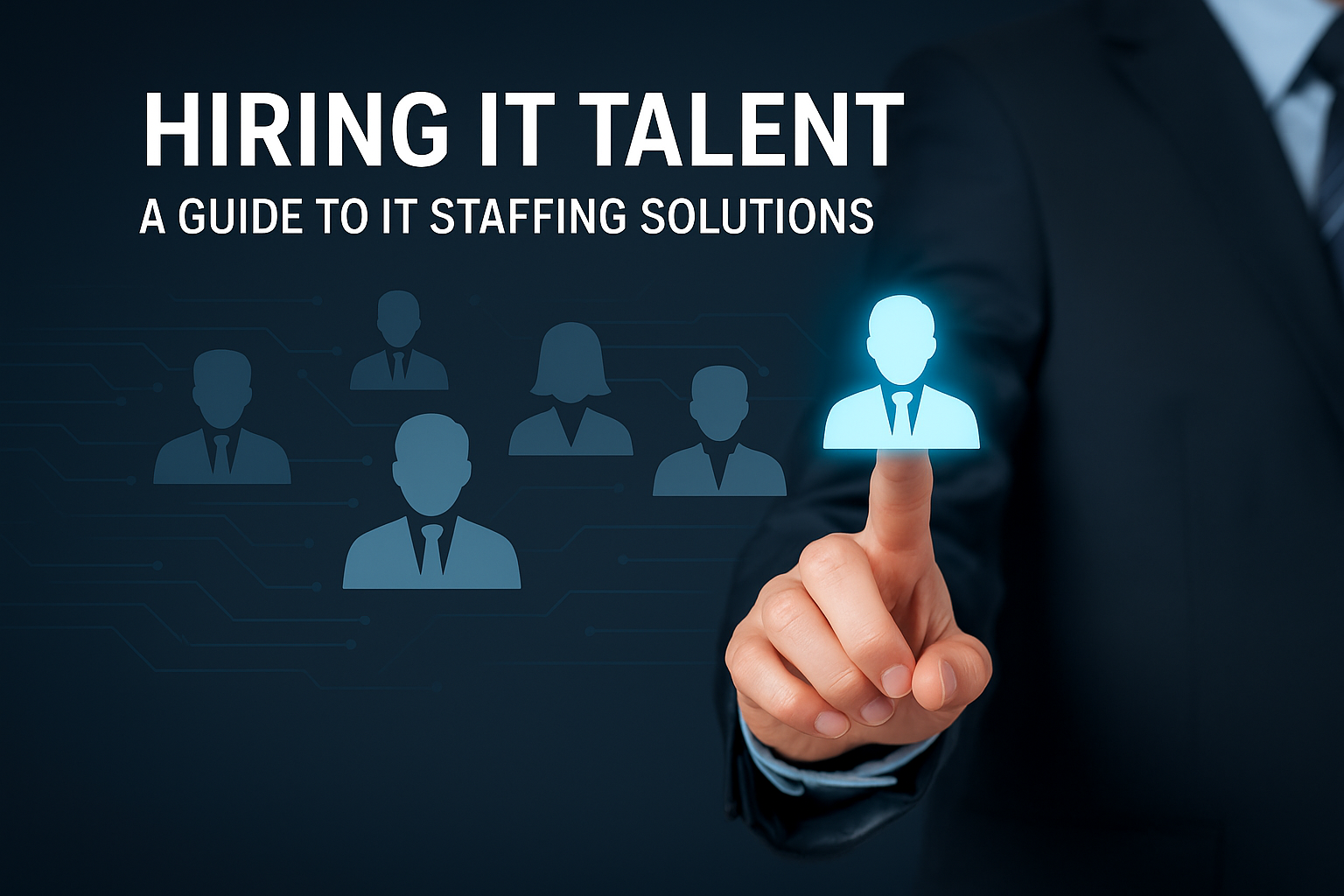IT Staffing and Tech Talent Acquisition in 2025

Hiring IT professionals today is not just about filling roles — it's about precision, adaptability, and strategic vision. Whether you're a startup trying to scale or a Fortune 500 enterprise managing digital transformation, the tech talent challenge is real. This comprehensive guide breaks down everything you need to know about IT staffing, IT staff augmentation, tech staffing services, and how to partner with the right technology staffing agency to win in 2025 and beyond.
Table of Contents
- The Ultimate Guide to IT Staffing and Tech Talent Acquisition in 2025
- 1. What Is IT Staffing?
- 2. Core Types of IT Staffing Solutions
- 3. Why Tech Staffing Services Are Exploding
- 4. IT Recruitment Strategies That Work (And Those That Don’t)
- 5. How to Hire IT Professionals: Step-by-Step
- 6. IT Staff Augmentation vs Traditional Hiring
- 7. Working with a Technology Staffing Agency: What to Expect
- 8. Top IT Roles in Demand in 2025
- 9. Red Flags to Watch When Hiring IT Talent
- 10. Final Thoughts: There’s No One-Size-Fits-All
- Frequently Asked Questions (FAQ)
1. What Is IT Staffing?
Let’s start with the basics — IT staffing refers to the process of identifying, sourcing, vetting, and placing skilled professionals in information technology roles. These positions might be full-time, contract, project-based, remote, or on-site.
But IT staffing isn’t one-size-fits-all. That’s the real kicker. The best staffing strategies are fluid, industry-aware, and customized to match not just job descriptions, but business models and team dynamics.
2. Core Types of IT Staffing Solutions
There are several ways companies tap into IT talent. Here’s a breakdown of the most common IT staffing solutions:
| IT Staffing Solution | Best For | Typical Duration | Flexibility |
|---|---|---|---|
| Direct Hire Placement | Long-term roles, leadership, in-house R&D | Permanent | Low |
| Contract-to-Hire | Try-before-you-commit hires | 3-12 months | Medium |
| Project-Based Consulting | Short-term specialist support | Weeks to months | High |
| IT Staff Augmentation | Scaling teams fast without full employment | Ongoing, often renewable | Very High |
| Managed Services (MSP) | Outsourcing outcomes, not people | Long-term contracts | Depends on scope |
3. Why Tech Staffing Services Are Exploding
It’s not just hype — the demand for tech staffing services has surged due to:
Talent Shortages: The global tech talent gap is expected to hit 85 million unfilled roles by 2030.
Remote Work: Companies now compete for talent globally.
Speed-to-Hire Pressure: Top candidates get snatched in under 10 days.
Project-Driven Needs: Not every project justifies a full-time hire.
Cost Optimization: Contract and augmented staff reduce overhead.
According to CompTIA, nearly 70% of CIOs report talent acquisition as their biggest growth constraint in 2025.
4. IT Recruitment Strategies That Work (And Those That Don’t)
Let’s be honest. Not every IT recruitment strategy pulls its weight. Some feel like you're fishing with a stick in the ocean.
✅ Strategies That Work:
Proactive Talent Pools: Building a bench before you need it.
Partnering with Niche Tech Staffing Agencies: They know where the unicorns hide.
Data-Driven Screening: Skills tests, real-world project samples.
LinkedIn & GitHub Sourcing: Where devs actually hang out.
Flexible Work Offerings: Remote-first is a magnet.
❌ Strategies That Flop:
Over-relying on job boards.
Ignoring employer branding.
Lengthy, bureaucratic interview processes.
Not involving technical leads in final hiring decisions.
5. How to Hire IT Professionals: Step-by-Step
Whether you’re hiring your first developer or scaling an entire DevOps team, here’s a proven path to follow:
Step 1: Define the Role Beyond the Title
Skip the generic job description. Outline:
Project context
Tech stack
Team structure
Must-have vs nice-to-have skills
Step 2: Choose the Right Staffing Model
Ask: Do you need full-time help or short-term expertise? Consider:
IT staff augmentation for urgent, project-based needs.
Direct hire if you're building long-term product teams.
Step 3: Work With a Technology Staffing Agency (Optional but Powerful)
Why? They:
Access pre-vetted talent
Reduce time-to-hire
Understand tech-specific nuances
Step 4: Interview Effectively
Structure it like this:
Technical screen (live coding or take-home test)
Soft skills & collaboration assessment
Final cultural fit check
Step 5: Make a Fast, Competitive Offer
Good IT professionals won’t wait two weeks. Move quickly. If you like someone, others do too.
6. IT Staff Augmentation vs Traditional Hiring
Let’s pause here because IT staff augmentation is often misunderstood.
What It Is:
A flexible hiring model where companies “rent” skilled IT professionals (individually or in teams) from a third-party provider.
Benefits:
Fast scaling without long-term commitment
Easier to plug skill gaps for projects
Reduced HR/legal overhead
Comparison Table: IT Staff Augmentation vs Traditional Hiring
| Factor | Staff Augmentation | Traditional Hiring |
|---|---|---|
| Time to Hire | 1–2 weeks | 1–3 months |
| Cost (Short-Term) | Higher per hour | Lower per hour |
| Cost (Long-Term) | No benefits/insurance | Full employee costs |
| Scalability | Highly flexible | Rigid |
| Skill Match | Highly targeted | More general |
| HR Burden | Handled by vendor | Handled internally |
In fast-paced tech environments, staff augmentation often makes more sense than hiring internally.
7. Working with a Technology Staffing Agency: What to Expect
So you’re thinking of outsourcing the headache. Here’s what to expect from a quality technology staffing agency:
Discovery Call: They’ll dig into your hiring needs, tech stack, timeline, and budget.
Candidate Shortlist: Usually within 48–72 hours for urgent roles.
Interview Coordination: Some agencies even help conduct technical screens.
Ongoing Support: They manage onboarding, payroll, compliance (especially useful if hiring internationally).
Quick Tip:
Ask if they specialize in IT/tech — not all staffing agencies do. You want recruiters who understand the difference between React and Ruby.
8. Top IT Roles in Demand in 2025
Here’s a quick snapshot of high-demand roles you’ll likely need help hiring for:
| Role | Core Skills Needed |
|---|---|
| Software Engineers | JavaScript, Python, C#, cloud platforms |
| DevOps Engineers | CI/CD, Kubernetes, Terraform, AWS |
| Data Scientists | Python, ML, SQL, data visualization |
| Cybersecurity Analysts | Pen testing, SIEM tools, compliance frameworks |
| Cloud Architects | Azure, AWS, GCP architecture, cost optimization |
| IT Project Managers | Agile, Scrum, stakeholder communication |
| QA Engineers | Test automation, Selenium, performance testing |
9. Red Flags to Watch When Hiring IT Talent
✘ Résumés with tons of buzzwords but no code samples
✘ Candidates who avoid technical tests
✘ Recruiters who push candidates without real references
✘ Agencies that charge upfront without a clear process
✘ “Jack of all trades” applicants — usually, masters of none
10. Final Thoughts: There’s No One-Size-Fits-All
Let’s be real — hiring IT talent is part science, part art. What works for a fintech startup won’t fit a manufacturing giant going through digital transformation.
But if there’s one truth across the board, it’s this:
The right IT staffing strategy can dramatically change how fast you innovate, scale, and compete.
Whether that means partnering with a technology staffing agency, embracing IT staff augmentation, or tightening your IT recruitment strategies, what matters most is staying nimble.
Frequently Asked Questions (FAQ)
1. What is the difference between IT staffing and IT staff augmentation?
IT staffing is a broad term for placing tech talent in roles. IT staff augmentation is a specific model where external tech professionals are hired on a flexible, contract basis to support in-house teams.
2. When should a company use a technology staffing agency?
If you're struggling to find specialized IT talent, need to scale quickly, or want to reduce the burden on internal HR teams, a tech staffing agency can streamline hiring and reduce risk.
3. What are the most in-demand IT roles in 2025?
Software developers, DevOps engineers, data scientists, cybersecurity specialists, and cloud architects are among the most sought-after roles.
4. Is IT staff augmentation cost-effective?
Yes — especially for short-term or highly specialized projects. It avoids the long-term cost of benefits, onboarding, and turnover.
5. How do I vet an IT staffing provider?
Look for tech industry specialization, transparent pricing, success metrics, case studies, and testimonials. Ask for sample profiles and turnaround times.


